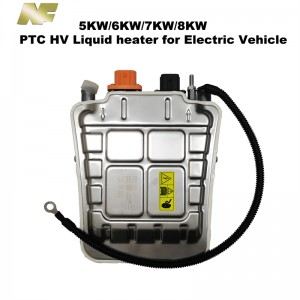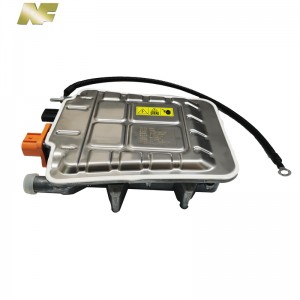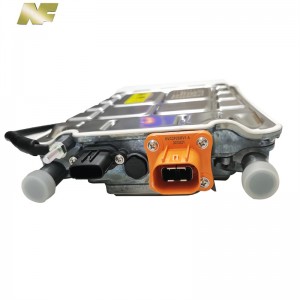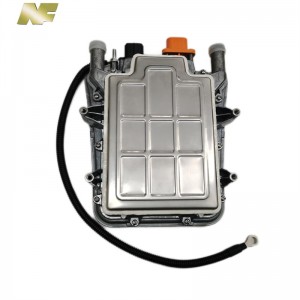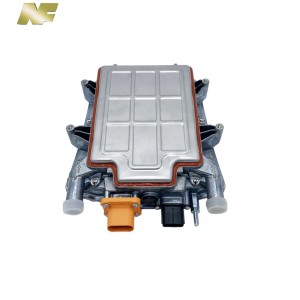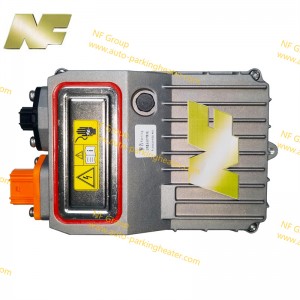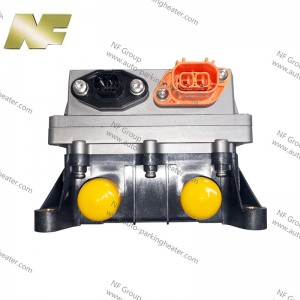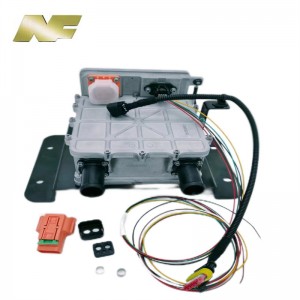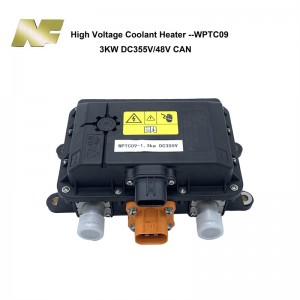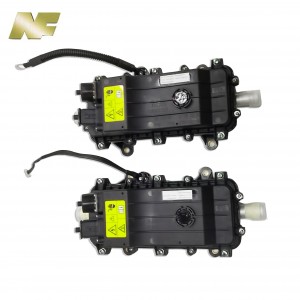NF 7KW HV Coolant Heater DC600V High Voltage Battery Heater
Technical Parameter
| Parameter | Description | Condition | Minimum value | Rated value | Maximum value | Unit |
| Pn el. | Power | Nominal working condition:
Un = 600 V Tcoolant In= 40 ° C Qcoolant = 10L/ min Coolant = 50: 50 |
6300 | 7000 | 7700 | W |
| m | Weight | Net weight (no coolant) | 2400 | 2500 | 2700 | g |
| UKl15/Kl30 | Power supply voltage | 16 | 24 | 32 | v | |
| UHV+/HV- | Power supply voltage | Unrestricted
power |
400 | 600 | 750 | v |
Product Size
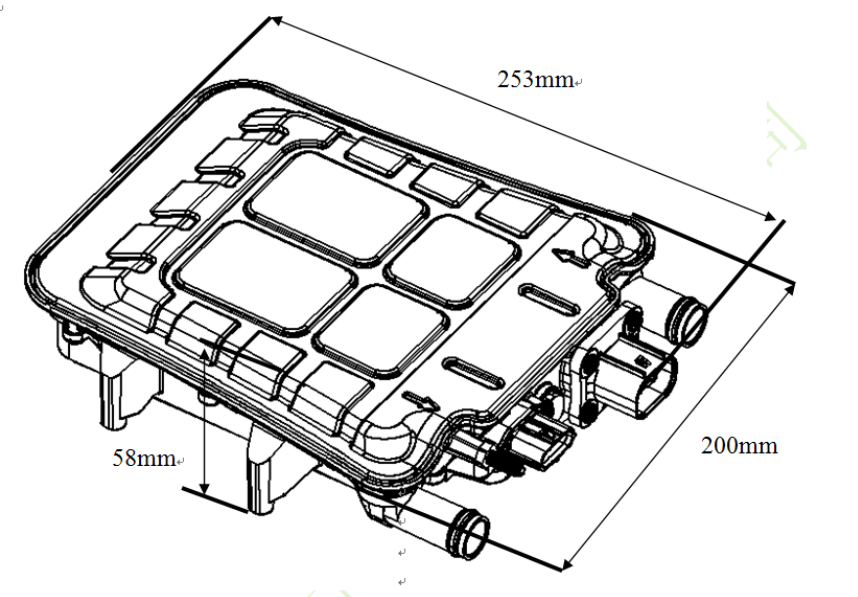
Description
As the demand for electric vehicles (EVs) continues to grow as a sustainable transportation solution, the development of advanced heating systems for EV batteries has become critical. In this blog, we’ll look at some of the cutting-edge technologies used to keep electric bus batteries warm during extreme weather conditions. We will focus on two key heating systems: high-voltage electric vehicle PTC heaters and high-voltage liquid electric heaters. Let’s dig into the details and learn how these innovative heating solutions are paving the way for efficient, reliable electric transportation.
1. High-voltage electric vehicle PTC heater :
The high-voltage electric vehicle PTC heater is a revolutionary heating system specially designed for electric buses. PTC stands for Positive Temperature Coefficient, which means the resistance of a heating element increases as temperature increases. This unique feature allows the PTC heater to self-regulate its heating capabilities, ensuring optimal and consistent battery heating.
The PTC heater uses state-of-the-art technology to effectively heat the battery without causing any damage. By utilizing high voltage, it maintains an ideal temperature range even in the harshest weather conditions. The system also offers improved safety features such as overheating protection and short circuit prevention.
2. High-voltage liquid electric heater :
In addition to PTC heaters, another breakthrough technology for heating electric vehicle batteries is high-voltage liquid electric heaters. The system circulates high-voltage liquid coolant throughout the battery pack, ensuring even and efficient heat distribution.
The liquid heater consists of a network of tiny tubes or channels strategically embedded within the battery module. These channels allow liquid coolant to flow and carry excess heat away from the battery, preventing overheating and potential damage. The heat transfer process is further enhanced using a specially formulated, highly thermally conductive coolant.
Electric liquid heaters offer several advantages over traditional heating methods such as air heaters. They are more energy efficient, reduce heat loss, and provide better control of battery pack temperature. This can improve the performance of electric buses, extend battery life and improve overall efficiency.
Conclusion :
As demand for electric buses continues to grow, ensuring battery system reliability and efficiency is critical. The use of advanced heating technologies such as high-voltage electric vehicle PTC heaters and high-pressure liquid electric heaters offers a promising solution to the challenges posed by extreme weather conditions.
These innovative heating systems not only protect batteries from freezing temperatures but also ensure optimal performance and longevity. By actively regulating battery temperature, they provide passengers with a comfortable and reliable experience while keeping e-mobility sustainable and environmentally friendly.
As research and development continues in this area, we can expect further improvements and novel solutions to shape the future of electric vehicle heating systems, making electric buses a more reliable and convenient transportation option for the masses.
Advantage
Application

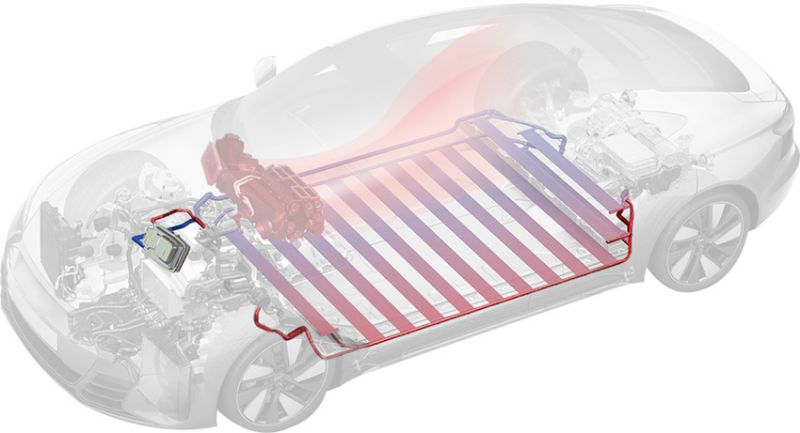
Packaging & Shipping
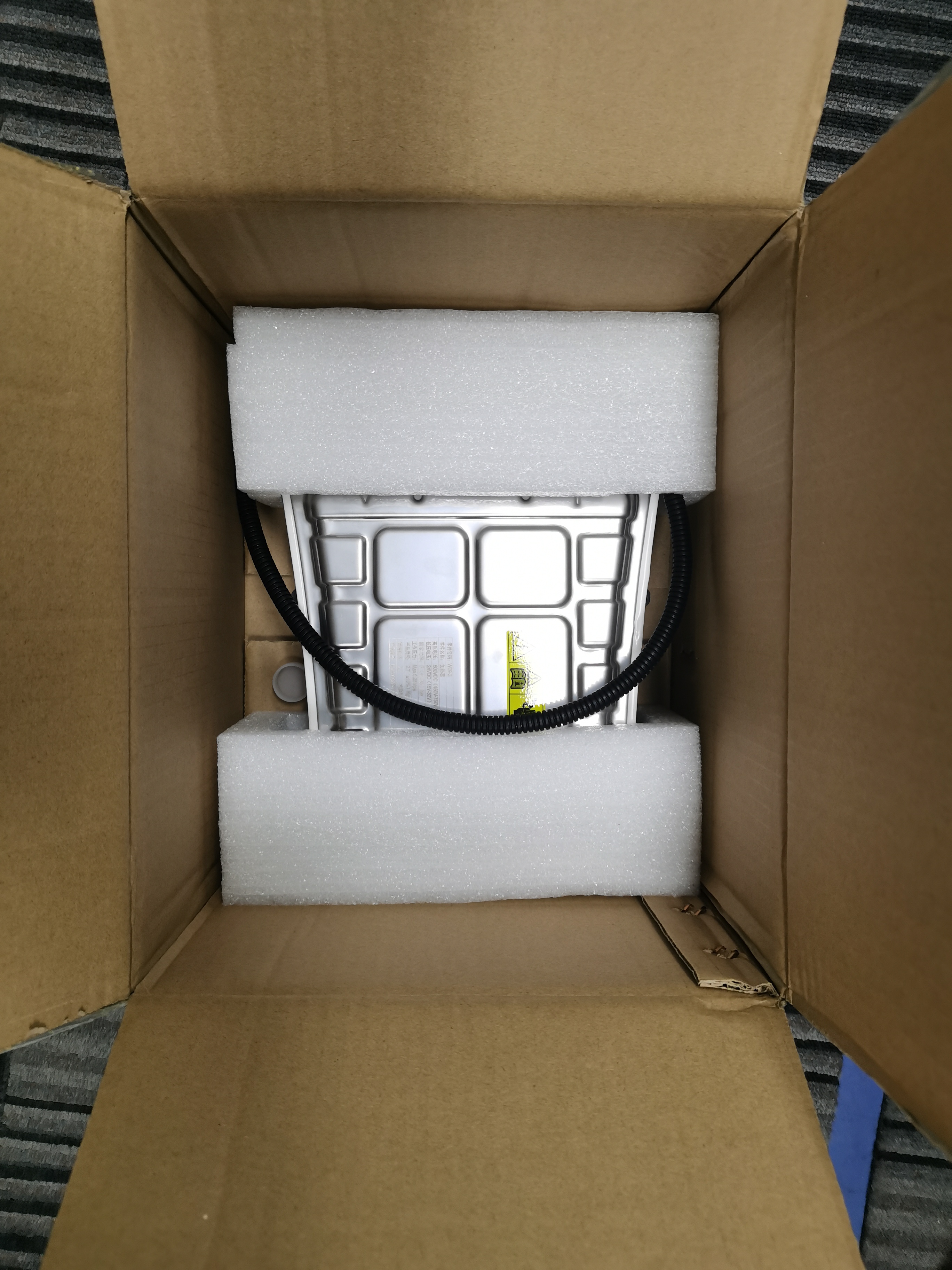

Our Company


Hebei Nanfeng Automobile Equipment (Group) Co., Ltd is a group company with 5 factories, that specially produce parking heaters, heater parts, air conditioner and electric vehicle parts for more than 30 years. We are the leading auto parts manufacturers in China.
Our factory's production units are equipped with high tech machineries, strict quality,control testing devices and a team of professional technicians and engineers endorsing the quality and authenticity of our products.
In 2006, our company has passed ISO/TS16949:2002 quality management system certification. We also bagged the CE certificate and Emark certificate making us among the only few companies in the world acquiring such high level certifications.
Currently being the largest stakeholders in China, we hold a domestic market share of 40% and then we export them around the globe particularly in Asia, Europe and Americas.
Meeting the standards and demands of our customers have always been our top priority. It always encourages our experts to continuously brain storm, innovate, design and manufacture new products, impeccably suitable for the Chinese market and our customers from every nook of the world.
FAQ
1. What is an electric bus battery heater?
The electric bus battery heater is a device used to regulate the temperature of the electric bus battery. It helps maintain the optimal operating temperature of the battery, especially in cold weather conditions, to ensure its efficiency and longevity.
2. Why do electric buses need battery heaters?
Electric bus batteries can be affected by extreme temperatures, especially in cold weather. Low temperatures can significantly reduce battery performance and overall range. Battery heaters are critical to preheating the battery and maintaining its temperature within an optimal range to ensure reliable operation and maximize bus efficiency.
3. How does the electric bus battery heater work?
Electric bus battery heaters typically use a combination of heating elements and temperature sensors to monitor and regulate the temperature of the battery. When the ambient temperature falls below a certain threshold, the heater kicks in and warms the battery. Temperature sensors help regulate heat output and maintain the desired temperature range.
4. What are the benefits of using battery heaters on electric buses?
There are several advantages to using battery heaters in electric buses. It helps maintain battery performance and range even in cold weather conditions. By keeping the battery within an optimal temperature range, the heater ensures efficient energy transfer and extends the battery's service life. It also reduces the risk of cold-start issues and enables faster charging in cold climates.
5. Can the electric bus battery heater be used in hot weather?
While the primary function of electric bus battery heaters is to heat the batteries in cold weather, some advanced systems can also cool the batteries in hot weather conditions. This helps prevent overheating and ensures optimal battery performance regardless of ambient temperature.
6. Will using a battery heater increase energy consumption?
While electric bus battery heaters do consume additional energy, they are a key component that help maintain battery efficiency, especially in cold weather. The energy consumed by the heater is insignificant compared to the overall energy needs of the bus, and the benefits far outweigh the additional energy consumption.
7. Can existing electric bus models be equipped with battery heaters?
Yes, battery heaters can often be retrofitted into existing electric bus models. Different manufacturers offer retrofit solutions that can be integrated into existing battery management systems. It is important to ensure compatibility as each bus model may have different installation requirements.
8. How much does a battery heater for an electric bus cost?
The cost of an electric bus battery heater can vary based on a variety of factors including battery size, system complexity and brand. Generally speaking, the cost can range from a few thousand dollars to tens of thousands of dollars.
9. Are electric bus battery heaters environmentally friendly?
Battery heaters for electric buses contribute to the overall sustainability and environmental friendliness of electric vehicles. By maintaining optimal battery temperatures, they increase the energy efficiency of buses, reducing the need for additional charging and minimizing energy waste. In addition, efficient battery heating allows for better utilization of mileage and reduces the overall carbon footprint of electric bus operations.
10. Are there any safety issues with electric bus battery heaters?
Battery heaters for electric buses are designed with safety in mind. They are rigorously tested and adhere to stringent safety standards to ensure their reliable, safe operation. Temperature sensors, overheating protection features and insulation mechanisms are often integrated into these systems to prevent any safety hazards.


